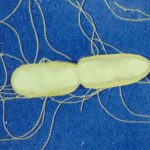Emerg Infect Dis, 2016 Jul; 22(7):1298-1302
It’s easy to remember Salmonella serotypes names, isn’t it? Surely, this is because the naming system of Salmonella serotypes is by far the most scientist friendly. Traditionally, most Salmonella serotypes have been named after geographic locations. We decided to explore the geographic locations to which Salmonella serotypes refer and describe some unexpected twists in the naming scheme. We found that 93% (n = 1,475) of the 1,585 serotypes could be categorized as geo-serotypes; that is, the name refers to a geographic location. The 3 countries with the most geo-serotypes are Germany, the United Kingdom, and the United States. Other serotype names refer to the name of a person, animal, tribe, or food item or are a composite of symptoms and host. The Salmonella serotypes naming scheme has had a valuable effect on public health microbiology, and in the current era of fast development of whole-genome sequencing, it should remain a reference.


